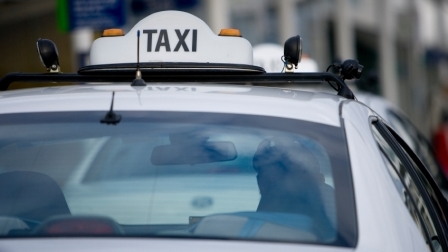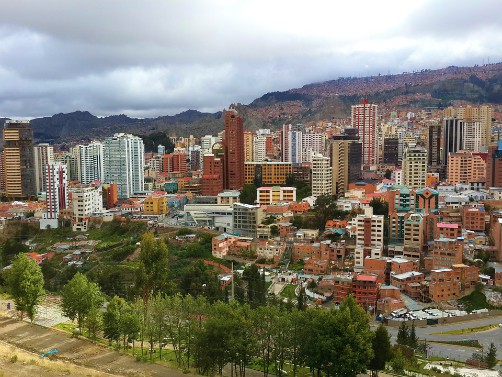|
All the Types of Taxis in Bolivia Here's why so many of us end up turning our lives over to taxis in Bolivia: one of the hardest things for tourists and expats to adjust to in Bolivia, is the utter chaos they encounter on Bolivia's streets. Traffic jams that, in our minds, could be so easily avoided. Drivers who understand traffic signs and signals as more of a suggestion than actual law. Cars racing to be the first through an intersection. People literally hanging off to sides of taxi vans and buses. Little children running between cars to wash windshields or ask for money. For pedestrians, crossing a street looks more like a speeded up version of "the twist" as we dart between moving vehicles. And the noise pollution... oh the glorious noise of a thousands cars all honking angrily at the same time. It's become a thing of legends, really.
This my friends, is why so many seasoned expats who are actually expert drivers, and possibly even licensed to drive in multiple countries, are scared to death to drive in Bolivia, and some have preferred to forego owning a car and instead, take taxis everywhere. Fortunately, taxis in Bolivia are fairly inexpensive and if you know how "the system" works, taxis are actually extremely useful. It's important, however, to know all the types of taxis in Bolivia that you can use, as some of them have fixed routes and others don't. And unlike other countries, Bolivian taxis don't have one uniform color (yellow for example) so you'll need to know how to identify which vehicles are taxis and which are not. Taxi safety is an oft-discussed issue in Bolivia where mugging taxi drivers and/or passengers for their money sometimes occurs, so it's important to learn about how to stay safe. But overall, using taxis in Bolivia can be a great and useful experience. There are 4 Types of Taxis in BoliviaThere are four types of taxis in Bolivia: privately owned cabs called "taxis particulares", company or fleet-operated taxis that are called "radiomóviles" or "radiotaxis", taxis with fixed routes which are called "trufis" and more recently, "app taxis" such as Uber and others which now operate in some parts of Bolivia as well. So let's break it down:
Taxis Particulares - Privately Owned TaxisTaxis particulares are privately-owned cabs that are basically vehicles of any type, driven by their owners. Anyone who has a car and some extra time, can just suddenly decide to be a taxi for a few hours or days or every day. They may or may not be clearly marked and may or may not have been registered by the owner as a taxi with the public authorities. Usually the owner of a car will just tape a small cardboard TAXI sign on their front windshield and drive around town picking up passengers wherever they can. Because they are not official taxi company cars, nor equipped with radios or meters, if they experience mechanical problems, are victimized in some way, or are involved in an accident, there may be no way to call for help unless the driver has a cellphone. In addition, if you forget any personal belongings in the vehicle, you will have no way to contact the driver later to recover them, unless they gave you their phone number. You will have no control over whether or not they charge you the correct fee, take the shortest route, have seatbelts or insurance, or are even licensed drivers.
Having said that, many privately owned taxis in Bolivia are driven by very friendly people, many of them university students or older people, who are hospitable, welcoming, and happy to help go out of their way to help or inform a foreigner. They may be very conversational, ask you if you need anything, give you suggestions or tips, and you may even make a new friend. Sometimes the owners of taxis particulares will give you their cellphone number so you can call them again sometime. Many of these (but not all of them) are now also signed up on various taxi apps. You should always discuss pricing with them before you get in, and be prepared to pay with exact change or small bills. Radiomóviles - Registered Taxi CompaniesRadiomóviles are also privately owned cars driven by their owners, but they work under officially registered taxi companies. These are usually clearly marked as taxis. They may have a placard in the front windshield, a small green or blue light above the front seat passenger’s visor, and side door magnets or stickers with a taxi company name, logo and phone number. These vehicle owners contract with a taxi company and pay the company daily for the use of radio equipment, which they install when they start their shift and return to the company at the end of their shift. The benefit to them is that they get a steady stream of riders and instructions from the company and do not have to drive around arbitrarily hoping they pick up passengers. The benefit to you is safety. In addition, by using a radio taxi, you can call a cab to pick you up anywhere at any time and drop you off at any destination without having to stand on a street corner trying to flag one down. You can even use one of the taxi apps that are popular in Bolivia. Radiomóviles are required to register the vehicle with police to let them know it's being used as a taxi. And they must have insurance. If you ever forget something in their vehicle, they are not liable or responsible for it, but it will be possible for you to at least call them to ask if the driver has found your items and can return them.
One of the most useful things about radiotaxis or radiomóviles is that you can pay them per run (por tramo) or by the hour (por hora). If you have multiple errands to run, it's cheaper to hire a radio-taxi by the hour. If you need someone to run errands for you, paying by the hour can be relatively inexpensive and a huge time-saver for you. They will even do your personal shopping. For example, you can call a taxi company and tell them you need a driver to pick up a prescription, pick up food you've ordered from a restaurant or go through a drive-thru for you, deliver or pick up your dry cleaning, go grocery shopping for you, and even pay bills for you at certain banks or companies. If you use a radiotaxi to run errands for you, and the driver does not have enough money for the errands you need them to do, they will come to your house first, pick up money from you, then run the errands and return. But if they have a driver who has sufficient money to run your errands directly, then upon returning to you, they will charge you for the time it took them to run your errands and you will pay them back the money they spent for you. Trufis - Taxis with Fixed RoutesTrufis are another type of taxis in Bolivia. They are taxis as well, but they have fixed routes in each city. Trufis are easily identifiable by two small flags flying on the front hood of the car, one to above the left headlight and one above the right. They may also be colored by route. Many trufis are also mini-vans or SUVs. All will have the trufi company logo on their doors. Of course, because of their fixed routes they do not provide door to door service, nor do they run errands. Instead, they pick up and drop off passengers continuously along their routes. They are basically tiny buses. The disadvantage of a trufi is that you will not be the only passenger and it will take much longer to get to your destination due to multiple stops to load and unload other passengers, just as a bus would do. Sometimes trufis pack more people in than they should and it can be cramped. Still, they are the most inexpensive of all taxis in Bolivia and they never stray from their routes so you'll never feel lost. There is safety in numbers. App Taxis in BoliviaBecause Bolivians are already so accustomed to calling privately-owned taxis and radio taxis in Bolivia super often anyway, it seems natural that Uber and other taxi apps would catch on quickly and easily here. Some see Uber and other apps as just another version of something we already did. The only downside or reason some tourists might find it difficult to use Uber and other taxi apps in Bolivia, is that many foreign mobile phones won't synch with the Bolivian mobile phone system at all and don't work here. Others work, but only if you pay for an additional "international calling plan" to be added onto your normal mobile phone contract for the duration of your trip. For this reason, you might want to make sure you're also using the Whatsapp app, a free calling and texting app that works all over the world on any phone. Everyone in Bolivia uses Whatsapp!     |


